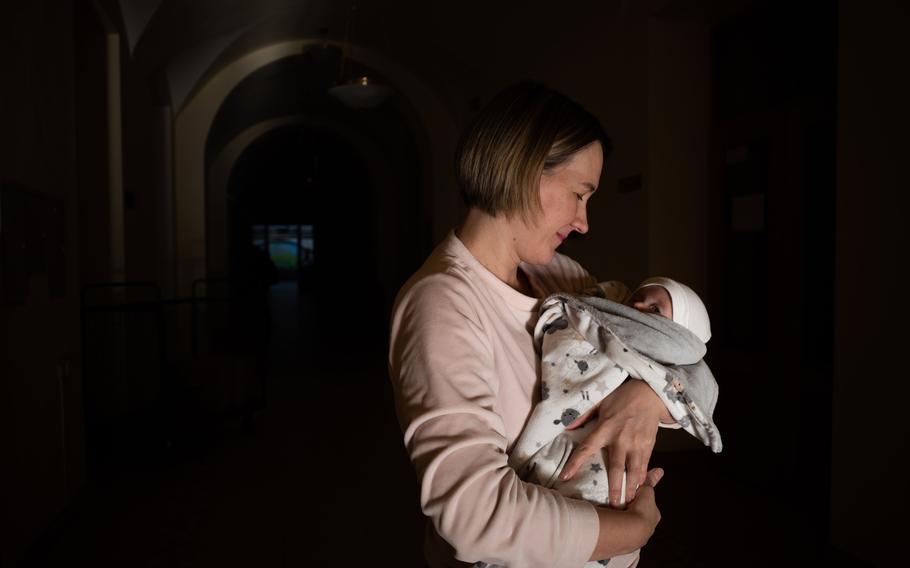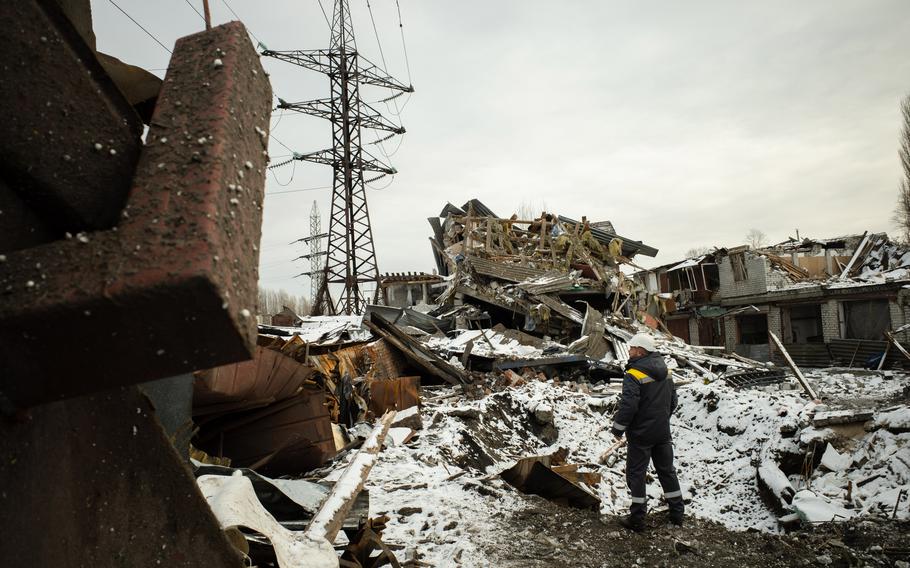
Olha Tkachuk with her daughter Nikol at the Ukrainian Children’s Cardiac Center in Kyiv, Ukraine, on Dec. 1. (Serhiy Morgunov/For The Washington Post)
KYIV, Ukraine — The electricity was out and the water service was cut off, and in an eighth-floor apartment in one of Kyiv’s outer neighborhoods, Olha Tkachuk felt like her world was coming apart.
A priest had come to her home to baptize her 4-month-old daughter, Nikol, who was scheduled to undergo lifesaving heart surgery the next day. Guests had arrived for the ceremony, and her oldest daughter, Kristina, 17, stepped out to grab extra pizza from a nearby cafe.
Just then, Russian missiles started slamming into the Ukrainian capital — again. The power went out. Kristina was trapped in the elevator. The surgery was thrown into doubt.
“I had one child in the elevator, the other I’m baptizing, and tomorrow we have a heart operation,” Tkachuk said. “This was a horrible time.”
The attack, on Nov. 23, was part of Russia’s relentless missile campaign targeting Ukraine’s energy systems, which has knocked out critical services across the country and, as the Kremlin clearly intended, disrupted the lives of ordinary Ukrainians, complicating decisions large and small.
With freezing temperatures setting in, residents of Kyiv and other cities are not only asking where to find heat, water and electricity but also wondering if they can stay in Ukraine. Officials are warning of a humanitarian catastrophe for those who remain and a new refugee crisis if too many leave.
In the meantime, stress is rising, including signs of tension among public officials responsible for making repairs, which are difficult, expensive, and, in some cases, impossible without scarce new equipment.
Ukrainian President Volodymyr Zelensky announced the creation of some 4,000 “Points of Invincibility” across the country - shelters where the population could keep warm, charge electrical devices, access the internet and get something warm to drink.
In a recent address, however, Zelensky said not all city governments “have done a good job,” singling out the Kyiv mayor’s Office.
“There are many complaints in Kyiv,” Zelensky said. “The points still need to be improved, to put it mildly. Please pay attention. Kyiv residents need more protection.”

A worker for the energy supply company DTEK is near the crater left by a Russian missile strike in Kyiv, Ukraine, on Dec. 2. (Serhiy Morgunov/For The Washington Post)
Kyiv Mayor Vitaly Klitschko rejected the president’s criticism. “I don’t want to engage in political battles, especially in the current situation,” he said. “It’s pointless.”
As the damage from the missile strikes has grown more extensive, repairs are taking longer, and much of Ukraine is experiencing several hours per day without electricity.
In Olha Tkachuk’s case, it took two hours to rescue her older daughter from the elevator. Father Pavlo, an Orthodox priest, conducted the baptism for Nikol and her fraternal, twin, Daniel — just in case the operation was not successful, Tkachuk said.
The next morning there was still no power, water and heat in their apartment nor, more importantly, at the Ukrainian Children’s Cardiac Center. Tkachuk and her husband, Volodymyr, nonetheless, collected their children’s belongings in the dark and headed to the hospital.
“When you are in a cold apartment, and you have to find water, which isn’t there, and there’s no light, and you have to bathe a small child in a cold bath, take it out and prepare it for surgery in the morning - this is very scary,” Olha Tkachuk said.
“But we had to go, because it was our last hope,” she added. “Because it could get worse.”
At the hospital, Illya Yemets, the director, told them there were sufficient generators and enough diesel fuel to operate medical equipment for the duration of Nikol’s surgery. But lack of heating and water was a problem. Nikol had a condition that severely weakened her lungs and she needed to be kept warm to avoid illness or infection. Water was also needed for the surgery.
Yemets said they should operate. It was “the lesser evil,” he said in an interview.
He explained that there was a risk of another attack, making the situation even worse. “But if we don’t operate, the child will die,” he said.
The operation was a success. There was enough water still in the hospital’s tanks. And while the lack of heat lowered the temperature in the operating room and intensive care unit, Nikol was kept warm by a special heated mattress and operating table.
“Thank God the temperature outside was only freezing, and not 10 or 15 degrees colder,” Yemets said.
The missile attack on Nov. 23 was one of the worst since Russian forces started to bombard Ukraine’s energy infrastructure in early October. When the barrage ended, almost all of Ukraine had been plunged into cold and darkness.
In Kyiv, a missile had damaged four lines, cutting power for nearly all the capital’s population on the east bank of the Dnieper River. Within six hours, the engineers restored two lines that supplied electricity to area hospitals, heating plants and water supply facilities.
But at another site in the city, engineers from DTEK, the country’s largest private electrical supplier, worked without sleep for 48 hours, in rain, snow and freezing temperatures. “This was probably the most difficult emergency recovery work for us - there was a lot of damage,” Andriy Toyunda, head of the repair brigade, said. “They brought us dry clothes and hot food and drink.”
On Monday, Russia again bombarded Ukraine’s energy system, launching more than 70 missiles, which resulted in blackouts in the southern city of Odessa and other locations nationwide.
Military and intelligence analysts believe Russian President Vladimir Putin hopes to demoralize Ukraine’s civilian population and compensate for Moscow’s lack of success on the battlefield. Ultimately, he hopes to create cracks in Ukrainian society, they say. On Thursday, Putin admitted targeting infrastructure but blamed Ukraine for provoking the strikes.
So far, his plan seems to be backfiring. In interviews, Ukrainians said they were even more resolute to hunker down and suffer through whatever this winter may bring. But there are also signs that on the edges, tempers are beginning to flare, as with Zelensky’s criticism of Kyiv.
Even when Russian rockets do not directly target Ukraine’s heating and water systems, the blackouts have a knock-on effect, said Dmytro Novytskyi, chairman of the Ukrainian association of water supply and sewage facilities.

The post-surgical recovery room for infants at the Ukrainian Children’s Cardiac Center in Kyiv, Ukraine, on Dec. 1. (Serhiy Morgunov/The Washington Post)
Without electricity, water pumps are unable to direct water to the population, Novytskyi said. The outages also hit Ukraine’s urban central heating systems in two ways - first by cutting off the water they use and second by disrupting electricity required to heat that water.
Novytskyi said that during the Nov. 23 attacks “water supply was stopped in nearly the entire country.” For the most part, he said it was restored “fairly quickly,” and “collapse” of the water system was averted because electrical engineers knew to restore electricity first to water supply and drainage facilities.
A week after the heart operation, Olha Tkachuk and Nikol were getting ready to leave the hospital. Nikol slept soundly, a tiny bundle in her mother’s arms. But her mother’s anxieties persisted.
Nikol still needed to be kept warm, she said. “If they turn off the heat again, we’ll need to go with our children to somewhere else,” she said. One option was to move to her husband’s parents’ location in another city, where they have a wood-burning stove. If that doesn’t work out, she said: “We’ll search for heat.”
Likewise, Yemets is confronting his own choices.
The Children’s Cardiac Center is Ukraine’s largest hospital for children with heart problems. It has been operating on 10 to 15 children per week during the war. A second location in Kyiv provides care to adults.
In the war’s first months, when fighting was close to Kyiv, the center moved its work to the basement of its building, and sent some doctors and equipment to Lviv in western Ukraine.
Now Yemets is asking where he will get the diesel fuel to keep the generators running if the blackouts last for longer periods. Already, parts of the hospital are working with lowered temperatures and other conservation measures in place.
He is again contemplating moving part of his operations to Lviv. But Lviv is also experiencing blackouts.
The main part of the clinic will remain in Kyiv. “As long as it’s possible,” he said. “We have to give a chance to all children and older people.”
For individual doctors at the hospital, the question of whether to stay also looms large.
“We are thinking about this every day and are discussing this every day with our friends and our colleagues - that this is a main question now,” said Sergey Varbanets, the head of the cardiac surgery department for adults.
A week before Nikol’s surgery, Varbanets was operating when the clinic suffered its first power outage resulting from a missile attack. Generators kicked in automatically, as planned, and all medical equipment worked without interruption. Still, Varbanets said there was unease in the operating room when it was announced that 10 more missiles were flying toward Kyiv.
Varbanets said the situation “will get even worse” because the Russians “don’t have any other choice.” He and his wife have discussed her leaving Ukraine with their children, as she did at the start of the war, before returning to Kyiv — an agonizing conversation.
“She does not want to escape without me - it’s not easy just to go to Germany,” Varbanets said, recounting their deliberations. “We are going to stay here,” he said. “And somehow to survive this winter.”